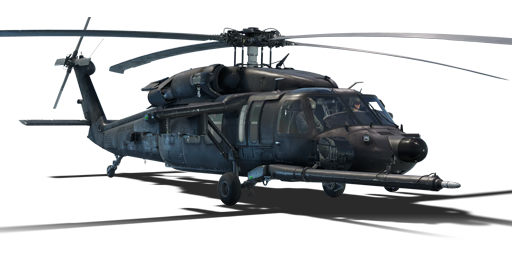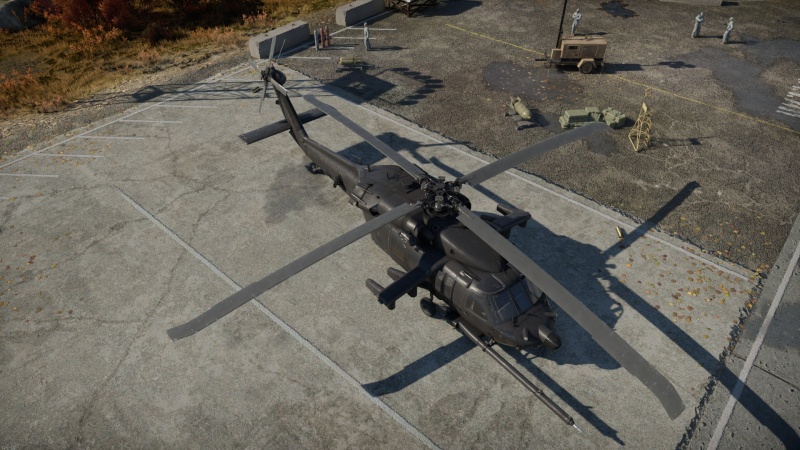Difference between revisions of "MH-60L DAP"
Colok76286 (talk | contribs) (Undo revision 191218 by U153435799 (talk)) |
Colok76286 (talk | contribs) (Undo revision 191217 by U153435799 (talk)) |
||
| Line 1: | Line 1: | ||
| − | + | {{Specs-Card | |
| − | |||
| − | |||
| − | |||
| − | |||
|code=mh_60l_dap | |code=mh_60l_dap | ||
|images={{Specs-Card-Image|GarageImage_{{PAGENAME}}.jpg}} | |images={{Specs-Card-Image|GarageImage_{{PAGENAME}}.jpg}} | ||
| Line 134: | Line 130: | ||
;Skins | ;Skins | ||
| − | |||
* [https://live.warthunder.com/feed/camouflages/?vehicle=mh_60l_dap Skins and camouflages for the {{PAGENAME}} from live.warthunder.com.] | * [https://live.warthunder.com/feed/camouflages/?vehicle=mh_60l_dap Skins and camouflages for the {{PAGENAME}} from live.warthunder.com.] | ||
| Line 146: | Line 141: | ||
;Related development | ;Related development | ||
| − | |||
* [[UH-60 (Family)]] | * [[UH-60 (Family)]] | ||
Revision as of 10:43, 21 August 2024
Contents
Description
By the end of the 1960s, the US Army had begun to formulate requirements for a military transport helicopter to replace the UH-1 Iroquois. Sikorsky engineers proposed their S-70 prototype (YUH-60) which, competing against the Boeing-Vertol Model 179 (YUH-61), was selected for serial production under the designation UH-60 Black Hawk. The new helicopter began to enter service in 1979 and subsequently underwent several upgrades and was produced in a huge number of modifications. In 1987, the Army placed an order for an improved armed version, the MH-60L, with more powerful engines and the ability to mount external weapons.
Some of the modernized MH-60L helicopters were subsequently further modified at the request of special operations forces. They were able to carry rocket pods, AGM-114 Hellfire ATGMs, air-to-air missiles, as well as other heavy weapons. Moreover, the troop-carrying cabin was reconfigured: the seats remained only for the onboard gunners, and an additional fuel tank was located in the rear. Helicopters of this version received the designation DAP (Direct Action Penetrator).
Introduced in Update "Kings of Battle", the MH-60L DAP is a specialized gunship helicopter. It still looks largely like a utility helicopter with an unmodified crew cabin but features large stub wings with four reinforced pylons. The DAP has a very similar arsenal and payload to the AH-64D Apache Longbow, mainly relying on powerful AGM-114K Hellfire II ATGMs, APKWS guided rockets, and ATAS air-to-air missiles at a slightly lower battle rating than the Apache Longbow. Although it obviously lacks the armour protection and internal gun of a purpose-designed attack helicopter, the DAP has some armament and subsystem advantages over the contemporary A-model Apache and is a solid, memorable option for helicopter fans.
General info
Flight performance
The MH-60 has generally pleasant flight performance and handling. The top speed is lower than the Apache and most other top rank attack helicopters, but this typically won't make a difference in gameplay outside of close-range rushing attacks.
| Characteristics | Max speed (km/h at _,___ m) |
Max altitude (metres) | |
|---|---|---|---|
| AB | RB | ||
| Stock | ___ | ___ | 5700 |
| Upgraded | ___ | ___ | |
Survivability and armour
The MH-60L has very limited armour protection, only boasting protected composite seats for the two crew members. There is no bulletproof glass to speak of and the Black Hawk's wide transport cabin is a bigger target for gunfire than the slim profile of the AH-1W for example. Most of the cabin is empty, so a spray of incoming machine gun fire might not hit much of importance if the crew is unscathed, but there are a pair of large fuel tanks at the rear that are vulnerable to damage.
Modifications and economy
Armaments
| Ballistic Computer | ||
|---|---|---|
| CCIP (Guns) | CCIP (Rockets) | CCIP (Bombs) |
| |
|
|
Offensive armament
The MH-60L DAP is armed with:
- A choice between two presets:
- 90 x countermeasures
- 90 x countermeasures + IRCM
Suspended armament
The MH-60L DAP can be outfitted with the following ordnance:
| Default weapon presets | |
|---|---|
| |
The DAP has very similar armament to other top-tier US helicopters for the most part. Pilots who have flown and spaded the previous OH-58D will in fact recognize all of the options here, in which case the principle difference is that the DAP has much better capacity than the Kiowa or AH-6M with four reinforced wing hardpoints.
The AGM-114K Hellfire II is the standard US top tier helicopter ATGM. It's well rounded in terms of speed, power, and range and the DAP can carry up to 16 of them just like the AH-64D, four times as many as the Kiowa. The contemporary AH-64A has the same capacity of AGM-114B Hellfires with slightly less TNT equivalent, slightly less penetration, and no tandem warhead, although in many cases the two Hellfire models will perform about the same.
The APKWS laser-guided rockets again come in two flavors: low-yield HE and even lower-yield SAP-HE, appropriate for taking out lightly armoured targets at a lower spawn cost and higher capacity than Hellfires.
The classic Hydra-70 rockets return, this time in generous 19-round pods. This allows the DAP to use rockets more freely than previous helicopters as a close quarters substitute for an internal gun.
The ATAS missiles come in twinned pairs and can be mounted on any of the four hardpoints, with a maximum capacity of eight (a new AAM record for US helicopters). However, the DAP doesn't have dedicated wingtip AAM hardpoints like the Apaches do, so taking Stingers will necessarily take away space from air-to-ground weapons.
In terms of guns, the DAP has some interesting options. There are two reserved mounts for M134 Miniguns that don't conflict with the other stores. While fun to shoot and better than having no guns, the rifle-caliber Miniguns are unlikely to do more than tickle ground targets. They're best used to spray down nearby helicopters, but keep in mind that they're less powerful than virtually any other top tier helicopter gun. The other two options are more lethal but don't have reserved hardpoints: the GAU-19 HMG-caliber gatling gun uses SLAP rounds with decent flat penetration but poor angled performance that can at least threaten thin-skinned targets and the LR30 cannons use the same 30 mm HEDP rounds as the Apache's chaingun with generally the best effect on ground vehicles out of the DAP's firearms.
Usage in battles
Describe the tactics of playing in a helicopter, the features of using the helicopter in a team and advice on tactics. Refrain from creating a "guide" - do not impose a single point of view, but instead, give the reader food for thought. Examine the most dangerous enemies and give recommendations on fighting them. If necessary, note the specifics of the game in different modes (AB, RB, SB).
Pros and cons
Pros:
- Good ordnance load, can carry a heavy load of AGM-114K Hellfire II ATGMs and Stinger AAMs for example
- MAWS, IRCM, and good flare capacity for self defense
Cons:
- No armour protection, larger profile than most attack helicopters
- No internal cannon and all options stronger than M134 Miniguns take space away from ordnance
- No dedicated AAM hardpoints
- Can't take Sidewinder missiles like the AH-64A or AH-1Z
History
Devblog
By the late 1960s, the U.S. Army began drawing up requirements for a new utility helicopter to replace the successful UH-1 Iroquois. Requesting design proposals in 1972, the Army was approached by several manufacturers, including Sikorsky, which put forward their S-70 design. Shortly afterward, Sikorsky received the order to construct several prototypes for comparative testing against the Boeing-Vertol's rival design. Designated as YUH-60, the Sikorsky's prototype first took to the skies in October 1974 before three units were delivered to the Army for trials in March 1976.
Being selected as the winning design by the Army later that year, the Sikorsky S-70 was ordered into production under the designation UH-60 and receiving the official nickname "Black Hawk". After the first units rolled off the assembly line, the Black Hawk entered service with the Army in 1979. After entering service, the Black Hawk received many modifications and upgrades which negatively impacted its performance characteristics. Due to the degrading performance, in 1987 the Army ordered the development of an improved version, the UH-60L. Most notably, this variant introduced more powerful engines and allowed the Black Hawk to carry a substantially higher payload of offensive weapons.
Media
- Skins
- Videos
See also
- Related development
External links
| Sikorsky Aircraft Corporation | |
|---|---|
| Utility | H-34 |
| Attack | MH-60L DAP |
| Export | ▄H-34 · AH-60 |
| USA helicopters | |
|---|---|
| Attack | |
| Black Hawk | MH-60L DAP |
| Choctaw | H-34 |
| Cobra | AH-1F · AH-1G · AH-1Z |
| SuperCobra | AH-1W |
| Kiowa | OH-58D |
| Little Bird | AH-6M |
| Apache | YAH-64 · AH-64A · ▃AH-64A Peten · AH-64A (GR) · AH-64D |
| Utility | |
| Huey | UH-1B · UH-1C · UH-1C XM-30 |





